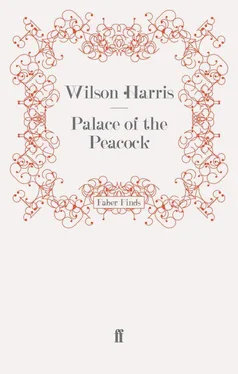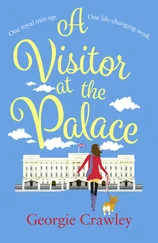Wilson Harris - Palace of the Peacock
Здесь есть возможность читать онлайн «Wilson Harris - Palace of the Peacock» весь текст электронной книги совершенно бесплатно (целиком полную версию без сокращений). В некоторых случаях можно слушать аудио, скачать через торрент в формате fb2 и присутствует краткое содержание. Год выпуска: 2013, Издательство: Faber Finds, Жанр: Современная проза, на английском языке. Описание произведения, (предисловие) а так же отзывы посетителей доступны на портале библиотеки ЛибКат.
- Название:Palace of the Peacock
- Автор:
- Издательство:Faber Finds
- Жанр:
- Год:2013
- ISBN:нет данных
- Рейтинг книги:5 / 5. Голосов: 1
-
Избранное:Добавить в избранное
- Отзывы:
-
Ваша оценка:
- 100
- 1
- 2
- 3
- 4
- 5
Palace of the Peacock: краткое содержание, описание и аннотация
Предлагаем к чтению аннотацию, описание, краткое содержание или предисловие (зависит от того, что написал сам автор книги «Palace of the Peacock»). Если вы не нашли необходимую информацию о книге — напишите в комментариях, мы постараемся отыскать её.
Palace of the Peacock — читать онлайн бесплатно полную книгу (весь текст) целиком
Ниже представлен текст книги, разбитый по страницам. Система сохранения места последней прочитанной страницы, позволяет с удобством читать онлайн бесплатно книгу «Palace of the Peacock», без необходимости каждый раз заново искать на чём Вы остановились. Поставьте закладку, и сможете в любой момент перейти на страницу, на которой закончили чтение.
Интервал:
Закладка:
Cameron scowled at Jennings. “Shit,” he said. “Let’s move. We got to keep turning. I vote like daSilva to go.” He adopted a belligerent air but he too was heartily uncertain and afraid.
Carroll had begun laughing and the fresh ringing sound of his voice made everyone forget himself and turn in involuntary surprise. The laugh struck them as the slyest music coming clear out of the stream. It was like a bell and it startled away for one instant every imagined revolution of misery and fear and guile. It was an ingenuous sound like the homely crackle of gossiping parrots or of inspired branches in the leaves, or the slicing ecstasy and abandonment of the laughing wood when the hunter loses and finds his game in the footmark he has himself left and made.
Carroll laughed because he could not help himself. He saw that the omens and engines of grace and salvation were so easily turned again into doom. He felt — without clearly understanding why — that the entire crew had been drawn together almost against their will it seemed now and that their living desire was ambivalent and confused as the origin of the first command they dimly recalled and knew in the grave of memory. Something had freed them and lifted them up out of the deeps, a blessing and a curse, a reverberating clap of thunder and still music and song. The sound was jubilant and obscure and tremulous in their ear like a dreaming sword that had cut them from the womb.
Wishrop and Vigilance stood silent listening to the sound of the sword and the bell in the stream. Wishrop was a man of about forty, I dreamed, scanning his features with the deepest attention. A strong aquiline face it was, and still delicate and retiring in mood. I remember how he balanced himself and stood with the promise of a dancer on the prow of the boat when it moved in midstream. He spoke infrequently and as brokenly and whimsically as his labouring companions. His desire for communication was so profound it had broken itself into two parts. One part was a congealed question mark of identity — around which a staccato inner dialogue and labouring monologue was in perpetual evolution and process. The other half was the fluid fascination that everyone and everything exercised upon him — creatures who moved in his consciousness full of the primitive feeling of love purged of all murderous hate and treachery.
He sought to excuse his deficiency and silence by declaring that he knew better Spanish than English. It was a convenient lie and it carried the ring of truth since he had lived for many years on the Guyana, Venezuela border. A look of unconscious regret and fear would flash when he spoke as if he feared he had already said too much. The crew knew what his guilt signified. He had whispered to them at various half-crazy times that he was dead for the record. He had told them secretly he would be a wanted man now, wanted for murder if it was known he was living. And so he wished to stay dead, he shouted, though he was perfectly alive.
He was mad they all knew. And yet harmless as a dove. They could not conceive of him as a real murderer. They preferred to accept his story as myth. He was an inspired vessel in whom they poured not only the longing for deathless obedience and constancy (which they read in his half-shadowed face) but the cutting desperate secret ambition he swore he had once nourished — the love that became its colder opposite — the desire they too felt, in their vicarious daydream, to kill whatever they had learnt to hate. This dark wish was the deepest fantasy they knew mankind to entertain.
As deep as the nameless fish Schomburgh sometimes hooked whose flat beady eyes and skulls made him shiver and fling them back into the river. Electric eels for example. His hands twitched with shock in the presence of these playful absurd monsters as before a spirit of innocent malady and corruption he knew in his blood and bone. Old as the hills it was, this electrification and crucifixion of the mind.
Wishrop had dared to kill what he had learnt to hate. That was his mythical recommendation. He had dared to purge himself free — to execute what troubled him, to pluck from a phantom body both its arm and its eye of evil.
The boon companions with whom he lived at the extremity of the known world were thieves. And the women were whores. They slaved for gold and diamonds, the most precious thing they knew. Wishrop did not feel himself superior to anyone. He was honest because of a native inborn fastidiousness like a man who loved wiping and cleaning himself for no earthly reason. He never wanted to conceal diamonds in his mouth and lodge them between the toes of his feet after a day’s work in the pits. Yet since everyone did it he accepted the principle and the practice. At that moment he started hating the phantom that was himself.
He saw himself reflected intimately in one of the women, dreamt he was in love with her, and unable to resist the challenge and the destiny of hate, married her and set her up to prove himself and his gods. The catechist who performed the ceremony sniggered behind his book. Wishrop marked him and never forgave him, swearing he was married now for good to the devil’s country, and that he had started courting hell and disaster.
He came upon his wife in bed with another man, and suddenly swept by a cold hard virginal joy and pleasure, knew abruptly, here was what he had waited upon to begin; he shot the couple in the head through the eye. He repaired to the drinking saloon cold and mad in his pride. The boon companions were riddled, astonished and surprised, waving their hand vaguely to the blind bullet.
He shot the catechist stone-dead and sniggering under a couple of whores on the pathway leading to church. Lastly himself.
That was the end save that Wishrop woke to find himself still alive; and crawling out of the fracas into the bush he met the inevitable Arawak woman (this was the crew’s ancestral embroidery and obsession) who nursed him to life. In the mortal hullaballoo that followed the muse reported that she had seen Wishrop crawling like a spider into the river where he had been tangled in the falls. Days after she pointed out his curious skeleton picked clean by perai, and that was the last of dead Wishrop.
The living Wishrop awoke overwhelmed by a final spasm of murderous fury and he shot the poor Arawak woman, his muse and benefactress. The curtain vanished upon this last act removing the web of death within himself. An eternity dawned. His victims had never perished, constantly moving before him, living and never dying in the eternal folk.
His faith and optimism endeared him to the crew and they fed upon his brief confessions and ravings as the way of a vicarious fury and freedom and wishful action they had known, not believing a word in the improbable tale he told of a harmless lover and lunatic: nevertheless they pledged themselves anew to the sense of their indestructibility.
BOOK THREE. THE SECOND DEATH
I tune the instrument here at the door,
And what I must do then, think here
before.
John DonneVII
The crew came around like one man to the musing necessity in the journey beyond Mariella. We set out in the rising sun as soon as the mist had vanished. We had in our midst a new member sitting crumpled-looking, like a curious ball, old and wrinkled. Her long black hair — with the faintest glimmer of silvery grey — hung in two plaits down to her waist. She sat still as a bowing statue, the stillness and surrender of the American Indian of Guyana in reflective pose. Her small eyes winked and blinked a little. It was an emotionless face. The stiff brooding materiality and expression of youth had vanished, and now — in old age — there remained no sign of former feeling. There was almost an air of crumpled pointlessness in her expression, the air of wisdom that a millennium was past, a long timeless journey was finished without appearing to have begun, and no show of malice, enmity and overt desire to overcome oppression and evil mattered any longer. She belonged to a race that neither forgave nor forgot. That was legend. In reality the legend and consciousness of race had come to mean for her — patience, the unfathomable patience of a god in whom all is changed into wisdom, all experience and all life a handkerchief of wisdom when the grandiloquence of history and civilization was past. It was the subtlest labour and sweat of all time in the still music of the senses and of design.
Читать дальшеИнтервал:
Закладка:
Похожие книги на «Palace of the Peacock»
Представляем Вашему вниманию похожие книги на «Palace of the Peacock» списком для выбора. Мы отобрали схожую по названию и смыслу литературу в надежде предоставить читателям больше вариантов отыскать новые, интересные, ещё непрочитанные произведения.
Обсуждение, отзывы о книге «Palace of the Peacock» и просто собственные мнения читателей. Оставьте ваши комментарии, напишите, что Вы думаете о произведении, его смысле или главных героях. Укажите что конкретно понравилось, а что нет, и почему Вы так считаете.












